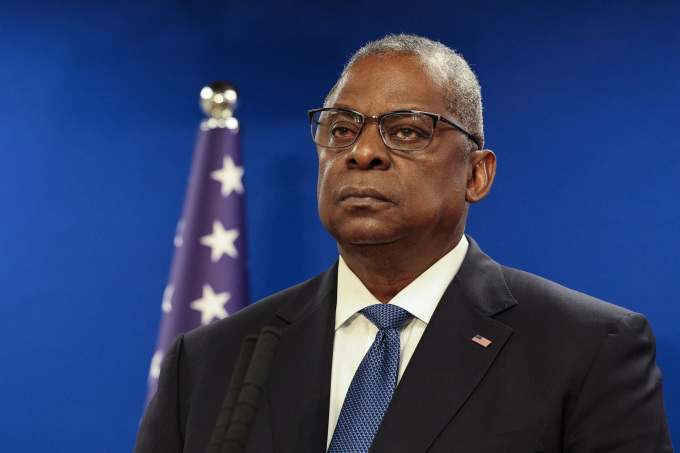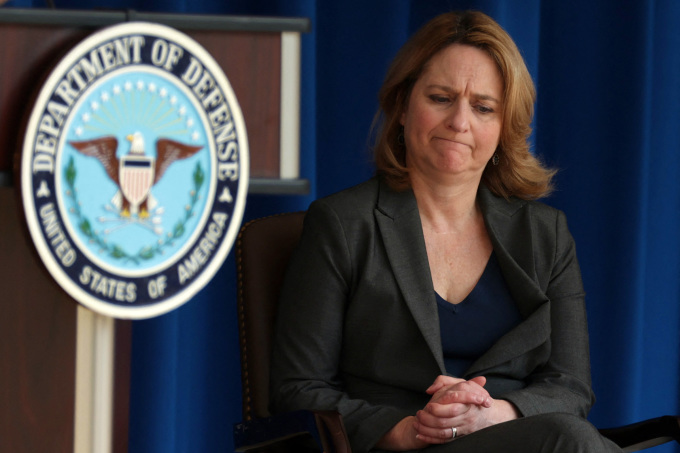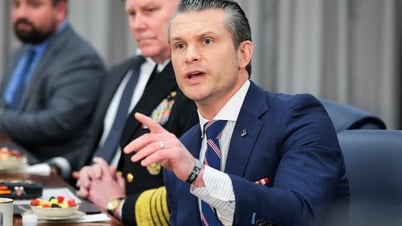During the time Defense Secretary Austin was hospitalized for surgery, information was kept so secret that even his deputy was unaware of the situation.
For four days earlier this month, most officials in Washington, including President Joe Biden, had no idea who was running the Pentagon.
Defense Secretary Lloyd Austin was secretly rushed to Walter Reed Army Medical Center on New Year's Day with severe nausea and pain. It took eight days for President Biden to learn why.

US Defense Secretary Lloyd Austin at a joint press conference with his Israeli counterpart Yoav Gallant in Tel Aviv on December 18. Photo: Reuters
The Department of Defense has seen an unprecedented series of events. Secretary Austin, who is sixth in line to the presidency and second in the military chain of command after the president, is unable to perform his duties. His deputy, Deputy Secretary of Defense Kathleen Hicks, was asked to take over while she was vacationing on a beach in Puerto Rico, days before President Biden was notified.
Only a handful of aides knew that Secretary Austin had been hospitalized. Most others at the Defense Department, including Deputy Secretary Hicks, were not informed, according to the Pentagon. Sasha Baker, the Defense Department’s top policy official and the highest-ranking official at the Pentagon at the time, attended a White House meeting on January 3 without knowing that Secretary Austin had been hospitalized.
According to observers, the incident at the Pentagon has raised doubts about how the US government ensures the continuity of operations of departments when leaders are incompetent or unable to make decisions.
When news of Secretary Austin’s hospitalization broke, it was met with immediate public backlash. Lawmakers, including some Democrats, expressed outrage at the cover-up. White House and Pentagon officials made clear their frustration with the lack of public disclosure of the Defense Department leader’s health status.
Many questions remain about the chain of events surrounding Secretary Austin's hospitalization, including who was in charge, when, and why there was no clearer information.
By the time President Biden was finally briefed, it had been more than a week since Secretary Austin, 70, had been hospitalized for complications from previous surgery to treat prostate cancer, and more than three weeks since his initial hospitalization just before Christmas.
Austin first went to Walter Reed Army Medical Center on December 22 for surgery to remove his prostate. He was placed under general anesthesia during the procedure. Defense officials said many of the secretary’s top aides were unaware he was undergoing a complex medical procedure that required hospitalization. However, Deputy Secretary Hicks was transferred to run the Pentagon during that time.
On the evening of January 1, Secretary Austin suffered from severe abdominal pain and was taken by ambulance to Walter Reed, where he was placed in the intensive care unit. Doctors determined that he had a urinary tract infection and fluid accumulation in his abdomen, requiring him to remain in the emergency room for several days.
On the day Austin was hospitalized, Pentagon Chief of Staff Kelly Magsamen was sick with the flu and her deputy was not in Washington, according to U.S. officials familiar with the matter, a factor that contributed to the delay in releasing the information.
On January 2, Deputy Secretary Hicks, who was vacationing in Puerto Rico with her family, was notified by the Pentagon that she was needed to assume some of Secretary Austin’s duties. The request came as a surprise because Hicks had planned to take a vacation and normally would have required her to be in Washington to perform the duties of Secretary of Defense.
Deputy Secretary Hicks was not informed of the reason for the sudden decision, but she did not ask why.
The media team that regularly travels with Hicks, even on vacation, has prepared everything for her in her hotel room, requiring her to stick to work, not to walk on the beach.
A Pentagon official said Deputy Secretary Hicks has begun making some routine management and operational decisions on behalf of Secretary Austin, and is "fully authorized and prepared to assist the President on other military matters as needed."
That same day, news of Secretary Austin's hospitalization reached several officials, including Chairman of the Joint Chiefs of Staff Charles Brown. However, Mr. Brown did not receive detailed information about the reason for Secretary Austin's hospitalization or the condition of the Pentagon chief.
Over the next two days, Secretary Austin's health continued to be kept secret by a small group of his aides.
While Secretary Austin was hospitalized and the White House and senior Pentagon officials did not know who was responsible, the US military carried out a drone strike against an Iran-backed militia leader in Baghdad, an action that had been approved in advance by Secretary Austin.
Air Force Maj. Gen. Pat Ryder briefed reporters on January 4 about the airstrike, but did not mention Mr. Austin's whereabouts.
The US military also issued an ultimatum to the Houthi forces in Yemen, demanding that the group stop attacks on cargo ships in the Red Sea or face consequences.
Deputy Secretary Hicks then continued to perform some duties while she was in Puerto Rico and the White House remained unaware.

US Deputy Secretary of Defense Kathleen Hicks attends a 9/11 memorial service at the Pentagon in September 2023. Photo: AFP
On the same day, Chief of Staff Magsamen shared information regarding Secretary Austin's health with national security adviser Jake Sullivan, who then relayed the information to President Biden.
Magsamen also told other top military officials that Secretary Austin was having health problems. The Pentagon said Hicks and Magsamen began making public statements, although Hicks appeared unaware that her superior was battling complications from surgery.
At 5:03 p.m. on January 5, the Pentagon announced that Secretary Austin had been hospitalized for an “elective medical procedure,” but did not provide further details. The statement said he had returned to full responsibilities, although there had been no previous announcement that Deputy Secretary Hicks had been assigned to run the Pentagon.
Congressional oversight committees learned of Secretary Austin’s hospitalization just minutes before the Pentagon issued a statement. By then, Austin had been at Walter Reed for nearly five days on his second hospitalization.
The next day, he issued a second statement pledging greater transparency. But during his January 6 conversation with President Biden, the defense secretary did not share his health status, and the president did not appear to ask.
John Kirby, a spokesman for the US National Security Council, said the White House pressed the Pentagon for an answer, but top Defense Department officials did not know either.
"This is my medical matter and I take full responsibility for my decisions to release information," Secretary Austin stressed last weekend.
On January 7, Major General Ryder issued a statement saying that Secretary Austin had spoken with Hicks and top military commanders and that he was recovering, but did not provide details about why Austin had surgery or whether this was his second hospitalization.
On January 8, the Pentagon pledged to conduct an internal review of the incident. Magsamen issued a memo on how to disclose information in the future, at the same time the White House reminded government agencies how to notify all relevant departments.
But Secretary Austin’s illness remained a mystery a week after his hospitalization. The Pentagon repeatedly said there was no excuse for the opacity, but it cited a number of reasons, including the secretary’s privacy, Magsamen’s flu, and internal misunderstandings.
Minutes before a scheduled 2:30 p.m. press conference on January 9, the Pentagon released a nearly 400-word statement providing information about Secretary Austin’s prostate cancer, the surgery he underwent, and the complications that forced him back to the hospital.
As Ryder briefed reporters at the Pentagon, National Security Council spokesman Kirby told White House reporters that President Biden only learned of Austin's cancer diagnosis earlier in the day, not from the defense secretary directly.
As of January 10, Austin was 10 days post-surgery in the hospital. He remains the head of the Pentagon.
Vu Hoang (According to WSJ, Reuters, AFP )
Source link



![[Photo] Prime Minister Pham Minh Chinh chairs meeting on science and technology development](https://vphoto.vietnam.vn/thumb/1200x675/vietnam/resource/IMAGE/2025/5/17/ae80dd74c384439789b12013c738a045)
![[Photo] Readers line up to visit the photo exhibition and receive a special publication commemorating the 135th birthday of President Ho Chi Minh at Nhan Dan Newspaper](https://vphoto.vietnam.vn/thumb/1200x675/vietnam/resource/IMAGE/2025/5/17/85b3197fc6bd43e6a9ee4db15101005b)

![[Photo] More than 17,000 candidates participate in the 2025 SPT Competency Assessment Test of Hanoi National University of Education](https://vphoto.vietnam.vn/thumb/1200x675/vietnam/resource/IMAGE/2025/5/17/e538d9a1636c407cbb211b314e6303fd)



























![[Photo] Nearly 3,000 students moved by stories about soldiers](https://vphoto.vietnam.vn/thumb/1200x675/vietnam/resource/IMAGE/2025/5/17/21da57c8241e42438b423eaa37215e0e)







































































Comment (0)